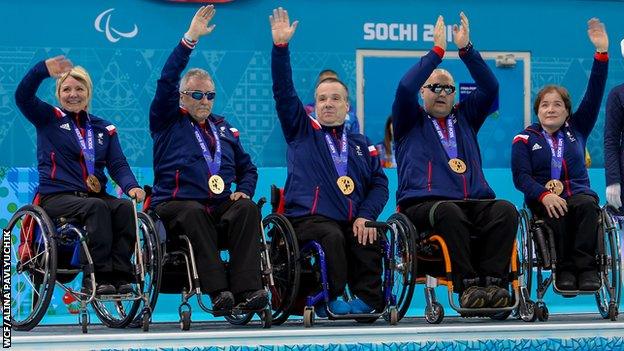Gregor Ewan: How Scottish wheelchair curler transformed his life
- Published

Ewan (second right) celebrates Paralympic bronze with his GB team-mates at Sochi 2014
After competing in his second Winter Paralympics in Pyeongchang in 2018, Scottish wheelchair curler Gregor Ewan faced a crossroads.
He had won a bronze medal with Great Britain in Sochi four years earlier, but came away from South Korea empty-handed after the team finished seventh in the round-robin stages and failed to qualify for the knockout phase.
Then came the devastating blow that Ewan was being dropped from the Scotland squad - and thoughts of international competition seemed a long way off.
But the 50-year-old has transformed his life, losing eight stones in weight and taking control of his pain management regime, and is now back representing Scotland at this week's World Championships in Beijing.
Ewan is also aiming to compete in a third Paralympics at the same venue in March.
"Being dropped was the kick up the backside I needed," admitted Ewan, who became a wheelchair user at 35 after years of lifting heavy stones and bricks on building sites led to a curvature of his spine and, eventually, a spinal collapse.
"It made me take a hard look at myself and my health - and one of the first things was the medication I was on.
"I had been dealing with a lot of pain in my back and was gradually increasing my tablet dosage because I wasn't getting enough pain relief.
"It was leading me to forget things. I can't remember conversations I had with my wife because I was so medicated and it was wiping out my mind.
"I had to do something because I felt like I was going off my head. I went to Gartnavel Hospital in Glasgow and I learned tips and tricks to help me gradually cut down the dosage, which took around six months."
Ewan's actions, and the new clarity it brought, helped him fully realise how he had been treating his body for many years.
Shopping on the high street for the 4 and 5 XL-sized clothes, which he had been wearing to accommodate his frame, was becoming almost impossible and his next step was to shed some of his near 24-stone weight.
By eating a regimented three meals a day and fasting from 6pm in the evening to breakfast time the next morning, he saw the pounds gradually disappear and a new man emerge.

Ewan has transformed his frame since the 2018 Winter Paralympics
"I had to stop when I got to 15 and a half stone because it was affecting the skin on my backside and I was starting to see the signs of sores," he added. "But I have managed to hold my weight around there. It is then about letting my body catch up and not push it too far. Even now I am careful about what I am eating.
"If you want it hard enough you will do it. There are lots of groups out there and videos to help. I smoked years ago and you will stop when you are ready, not when other people want you to do it. You are the only person that can fix it."
To get back into international reckoning, Ewan pushed himself hard off the ice in the gym on his strength and cardio work and with game analysis and tactics.
It all paid off when he returned to the Scotland squad in June 2020, but they had to immediately deal with the effects of the pandemic on the sport before returning to the ice late last year.
He will now line up alongside fellow Pyeongchang Paralympian Hugh Nibloe as well as David Melrose, Charlotte McKenna and Meggan Dawson-Farrell in Beijing - the last chance for teams to earn Paralympic qualification points.
The Scots open their campaign against Norway on Saturday, starting a busy period of 11 round-robin games in six days before the semi-finals on 29 October and the medal matches the following day.
Along with his fresh outlook on life, Ewan is reaping the benefits of his changed appearance.
"My stone delivery is better because I'm not falling onto my belly so much. My belly meant I got lazy in my chair," he said.
"Now, I'm falling onto my side more and am using my muscles more effectively. It also means I have control of the stone for a couple of seconds more which might not sound a lot, but has made a difference.
"I feel more comfortable playing this way than the way I was two years ago."
Two major tournaments in the space of six months is a new challenge for all of the 12 teams. But, while the lack of international competition has affected everyone, Ewan and his team-mates have used the time to work on their stamina in the gym and focus on playing the right shot at the right time on the ice.
"We've come together as a squad really well," said Ewan. "I've never played with David, Charlotte or Meggan internationally, but we work well as a squad and you can see it in things like gym sessions where we are supporting each other and pushing each other on.
"However, we need to all turn up from the start of the competition. In the past, we have started tournaments slowly and, at a Worlds, you have to perform over the first two days to have any chance. You can drop one game over that time, but no more than that."

From paneer to pioneer: Greg Jenner and guests examine the man credited with Britain's first curry house
Tony Bellew is Angry: Besides Gary Neville what frustrates Jamie Carragher most?
